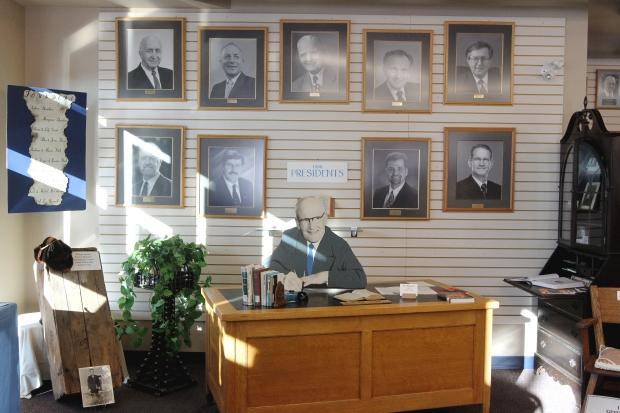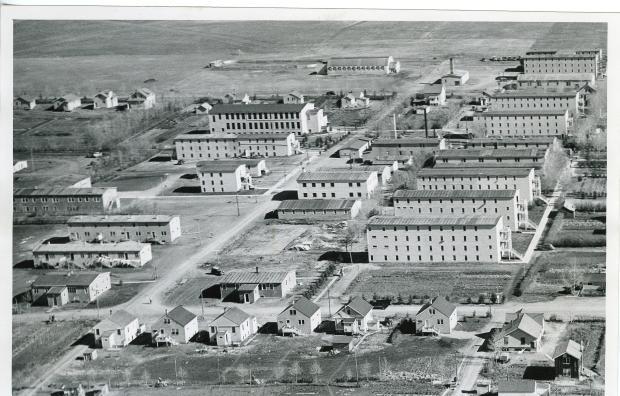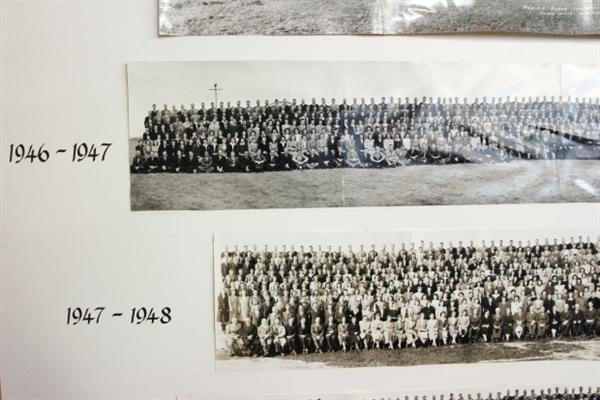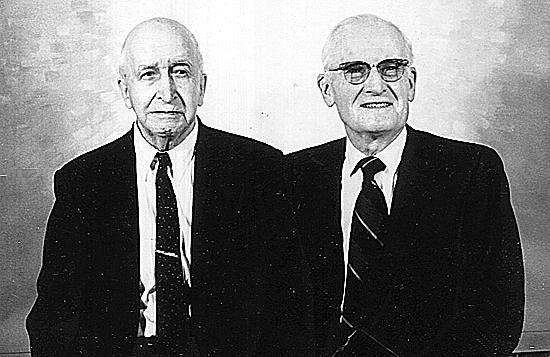By Jeremy Klaszus
Montreal Gazette
November 20, 2011
http://www.montrealgazette.com/news/alberta/Scandal+Bible+institute+wary+third+party+probe/5739310/story.html
 |
| A display at the Prairie Bible Institute campus in Three Hills, Alta. The school’s wariness of probe into abuse allegation by a third-party Christian group is consistent with its history. |
 |
| The campus housing at the Prairie Bible Institute, seen in this 1949 photo, resembles army barracks. |
 |
| The Prairie Bible Institute, which had more than 1,000 students in its postwar heyday, has suffered from plummeting enrolment and internal strife over the past decade. |
 |
| J. Fergus Kirk, left, and L.E. Maxwell co-founded the Prairie Bible Institute in Three Hills, Alta., in 1922. |
A group of Prairie Bible Institute alumni are calling for a third-party Christian group to investigate allegations of sex abuse at the Three Hills school.
But while Prairie has said it will co-operate with RCMP investigations, it is resisting calls to hire GRACE (Godly Response to Abuse in the Christian Environment), a Virginia-based group with expertise in handling abuse in religious organizations.
Instead, the board appointed one of its members to handle complaints from anyone claiming to be abused at the school.
That hasn't satisfied those wanting outside help.
"The survivors need to feel comfortable and confident that their voices will be heard in an objective manner," said Catherine Darnell, who has said she was abused at the school as a child. "Bringing in a party like GRACE that has no personal association (with Prairie) can facilitate that."
Boz Tchividjian, executive director of GRACE, says his group focuses on institutional response to abuse, and investigates after law enforcement has done its work.
"An outside party can come in and say, 'We don't really have a dog in this fight,' " he said, adding that his group would be open to working with Prairie.
Prairie's wariness of the group is consistent with the Bible school's history.
At one time one of the largest missionary colleges in North America, Prairie is rooted in an insular, almost military ethos.
L.E. Maxwell, the charismatic Kansan who founded Prairie in 1922, summed it up in his slogan for the school: "Training disciplined soldiers for Christ." (Current Prairie president Mark Maxwell is L.E.'s grandson.)
L.E. Maxwell refused to align the school with any one Christian denomination, preferring independence.
He viewed Prairie as a place under siege, and railed against the world outside.
"We need militancy in our faith before we shall get anywhere fighting the forces arrayed against us in these days," he wrote in 1931.
Many students observed that the crude campus housing resembled army barracks.
The school became a thriving commune, raising its own food, generating its own electricity and cutting its own lumber.
Another charismatic preacher, William Aberhart, became premier of Alberta in 1935.
As Preston Manning once put it, between Social Credit and Prairie Bible Institute, "the Canadian Prairies blazed with the spiritual fire of renewal and the political fire of prairie populism."
Today, Prairie has fewer than 300 students, but in its postwar heyday, it had more than 1,000, sending missionaries throughout the world.
"It's hard for some people to realize — especially because Prairie doesn't have nearly the profile that it once did — that this is a school with an international reputation," said Tim Callaway, an Airdrie pastor who grew up in Three Hills.
To train its disciplined soldiers, the school enforced strict rules forbidding men and women from interacting. They sat on separate sides in chapel, and ate on separate sides of the dining hall. Romantic interests were viewed as a distraction to God's work.
L.E. Maxwell gave a firm response when staff pushed for relaxed rules in the 1950s. A "little more supervised group activity" might be OK, he wrote, but "we must not entertain the idea, or practice, of dating among our attendants."
He ended his letter by reminding staff "we have been separated to a unique standard of schooling and training," and warned against becoming like other schools. The school also balked at outside academic accreditation.
Callaway, who did his master's research on sex abuse in churches and recently completed a doctoral thesis on Prairie's history, says the school had a "high authoritarian" atmosphere in which L.E., who died in 1984, spoke for God.
"You just didn't question him, at least publicly," he said.
After L.E.'s death, the school slowly started relaxing rules (staff, for example, were allowed to have TVs in their homes).
Callaway says he's unsurprised but saddened by the allegations of abuse at Prairie. He was also unsurprised when he heard that the board appointed a member to handle the matter, given the school's history.
"I thought, 'This is a chapter out of that same book — going to keep it internal, going to try to solve it in-house,' " said Callaway.
The school has suffered from plummeting enrolment and internal strife over the past decade, but this year the numbers levelled out.
Mark Maxwell, who took over as president last year, has repeatedly said the school is taking a new direction toward openness and transparency.
"There's this idea that the board is going to protect the image or the reputation of the school," said Maxwell. "No, that's the way you destroy the school, actually, by trying to artificially protect its reputation. I think we can leave the reputation of the school with God."
Prairie's willingness to publicly acknowledge the allegations would have been unheard of in years past. The school put a news release about the matter on its website before the Herald broke the story on Saturday, more or less inviting media scrutiny.
"The move could backfire," said Callaway.
But he praises the current administration for bringing the issue into the open.
"It's one of those situations where you're damned if you do, damned if you don't, really."
Any original material on these pages is copyright © BishopAccountability.org 2004. Reproduce freely with attribution.